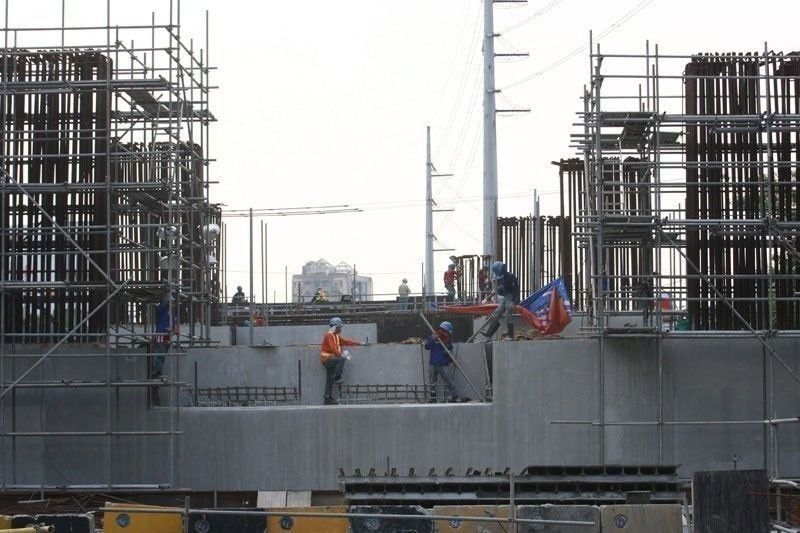Commentary: Ash clouds over infrastructure

Most recently, infrastructure officials of the Duterte administration have been touting infographics purportedly showing the administration’s legacy on infrastructure development in the Philippines. However, similar to the country’s experience with ashfall just a week ago, there are dark, toxic clouds ahead for infrastructure if immediate policy changes are not undertaken.
The infographic proudly declared the construction of 64 airports, 243 seaports, 2,709 bridges, and 9,845 kilometers of roads during the current administration, as if to confirm truly, that this is the country’s golden age of infrastructure.
However, eagle-eyed journalists were quick to unbundle the claims of government officials, as the infographic misleadingly included projects which never originated during President Rodrigo Duterte’s term, such as the Mactan Cebu International Airport and NLEX Harbor Link Segment 10, among others.
More importantly, these high-impact infrastructure projects are not even government-initiated, but successful public-private partnership proposals, all of which had the serendipitous fortune of having been completed during Duterte’s six-year term.
What the public is most interested however, is a truthful accounting of the status of infrastructure projects originated during Duterte’s term, particularly big-ticket projects which will be funded using foreign loans and grants instead of private sector funding.
This accounting is vital, especially since no less than the administration’s economic team had insisted on the primacy of official development assistance (ODA) as the main driver to construct new dams, bridges and rail systems.
The public should know whether the promised billion-dollar funding had now in fact been released, and whether certain delays in project timelines and construction are attributable to regulatory delay.
Government should also disclose the actual cumulative debt burden on Filipino families for undertaking these projects through ODA loans, especially as reports are rife that many foreign contractors tapped to construct these projects were blacklisted by multilateral agencies for corruption and other anomalies.
On the other hand, some infrastructure projects that originated under the current administration had been beset or stymied by questions on their legal frameworks. A week before the 2019 South East Asian Games, the Bases Conversion and Development Authority (BCDA) had been hounded by questions on the legality of its joint venture with its Malaysian partner for the construction of Clark sports facilities, as it appeared that the intention of the joint venture was not to enter into a viable term-limited commercial enterprise, but merely to work around public bidding requirements for the construction of facilities.
Luckily for BCDA, the Philippines topped the SEA games tally and no congressional inquiries had yet been scheduled to inquire on these concerns.
Similarly, the Marawi rehabilitation project had been severely delayed not only due to continuing safety concerns in the area, but also because of questions on the legal framework to undertake the rehabilitation.
For several months, negotiations were made with several local and foreign contractors to enter into a joint venture with the National Housing Authority to rebuild Marawi’s most affected area.
However, negotiations stopped abruptly, due to various legal and technical concerns, such that government had decided to scrap the joint venture proposal entirely. The scrapped joint venture proposal and its failed negotiations unfortunately cost months-long delay and until today, not a single hollow block has been built in central Marawi.
But the most concerning at the moment is the unprecedented government intervention in infrastructure projects and transport initiatives, which appears mainly an exhibition of raw political power than taking heart of the public interest.
One example is the heavy-handed stomping down of transport agencies on motorcycle taxis, but only to be unceremoniously rebuffed when the president’s closest ally and confidante, Sen. Christopher “Bong” Go urged transport executives to reconsider their obstinacy, allow motorcycle taxis to continue plying the streets, and refrain from arresting hapless working-class motorcycle drivers.
The transport officials’ lightning-fast change-of-heart clearly suggests that their bullheadedness was by no means based on a clear understanding of the country’s transport system and infrastructure deficit but more of an exercise of imagined political power.
And truly, these developments in the infrastructure sector have not benefited the wider economy. The Philippine stock exchange index, which is an objective indicator of investor confidence on the country’s fundamentals, remains slumped at the 7500 mark, failing to make its supposed realistic target of 8,000 in 2019.
The jobs promised under the “Build, Build, Build” program remain unrealized, especially if the pronounced employment generation statistic does not cohere with the data of the Philippine Statistics Authority regarding total employment in the construction sector in 2019.
With government continuing to pin its hopes on infrastructure as the country’s main economic driver, these ash clouds over the sector should put everyone on high alert.
With only a year and a half until the next election cycle, reversing these negative trends will take more than mere infographics by government officials. Instead, government should reevaluate which projects remain viable and deliverable within the remaining years of Duterte’s term.
More so, it should determine whether it can confidently seal its legacy on infrastructure, and whether we truly have a golden age of infrastructure in our midst.
Terry Ridon is fellow for Infrastructure of think tank Stratbase ADR Institute, convenor of Infrawatch PH, and former chairman of the Presidential Commission for the Urban Poor. He was a member of the House Transportation Committee of the 16th Congress.
- Latest

























